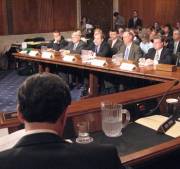Have you discovered The Alexandria Project?
 If you've been following the ongoing mobile operating system wars between companies like Motorola Mobility, Apple, Google and Samsung, you may recall that the biggest hammer a patent owner can wield is to prevent a competitor from selling a product. In the regular courts, this is achieved by pbtaining an injunction, which is a court order that bars such sales from occurring. In this situation, the patent owner claims that it can't be adequately compensated after the fact by damages.
If you've been following the ongoing mobile operating system wars between companies like Motorola Mobility, Apple, Google and Samsung, you may recall that the biggest hammer a patent owner can wield is to prevent a competitor from selling a product. In the regular courts, this is achieved by pbtaining an injunction, which is a court order that bars such sales from occurring. In this situation, the patent owner claims that it can't be adequately compensated after the fact by damages.
But the US courts haven't been favorable to this approach since a key Supreme Court ruling in 2006, leading companies to seek an alternate route to a similar result: a judgment by the International Trade Commission (ITC), barring the competitor from importing any product into the U.S. that infringes on the patent. If that patent is essential for implementing a standard that is, in turn, essential to performing the device's function, then you've effectively barred its competitor from being a competitor at all - at least in the U.S.
| Whether or not this should be permitted will be the subject of a hearing before the influential Senate Judiciary Committee today, and if you’re so inclined, you can watch that hearing by clicking on the link you’ll find here. The stakes we’re talking about here are significant, both in the case of mobile devices, as well as with respect to technology generally, where standards essential patents are legion. Both the Federal Trade Commission and the Department of Justice are of the opinion that securing bans on product sales through the ITC gives the owner of a “standards-essential patent” too much clout, allowing it to extort unreasonable licensing fees from its competitors, thereby restraining trade in violation of the antitrust laws. As a result, Edith Ramirez, an FTC Commissioner, and Joseph Wayland, the DoJ’s top antitrust enforcer, will testify at the hearing. the hearing is significant for another reason as well. Normally, a patent owner is only obligated to make a pledge to license a standards essential patent to a competitor if it was part of the standards organization that created the standard. The larger question is whether any company, whether or not it helped create a standard, can be compelled to license such a patent on “fair, reasonable and non-discriminatory” (FRAND) terms (what constitutes a FRAND license offer is an equally contentious issue). Historically, this is never been the case, and any action by a national legislature to compell such a result would be very controversial. While barring a company from seeking an order from the ITC to bar sales of a product infringing a standards essential patent would fall short of that result, it would still be significant not only to the combatants in the mobile device wars, but to the vendors – and users – of all standards-compliant products as well. |
Have YOU Discovered the Alexandria Project? A Tale of Treachery and Technology
The only thing ficticious is that it hasn’t happened yet
Available Now for $2.99 or less |
For this reason, the owners of large patent portfolios will be watching this hearing, as well as any follow-on effects, with great interest.